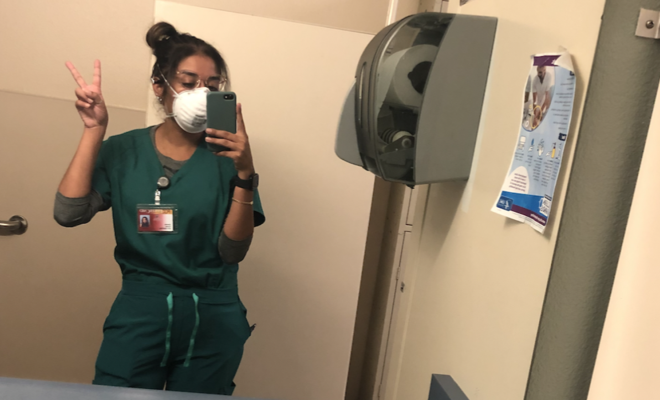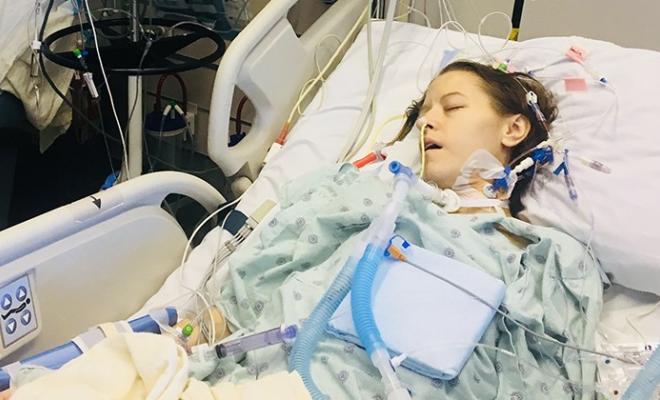In order to tell you about my cystic fibrosis diagnosis, I have to begin with my liver transplant journey. I promise everything will come together in the end so bear with me.
When I was a baby, my mother would change my diapers and she would notice my stool was a bit greasy. She continued to notice this and mentioned it to my pediatrician, but she was told it was nothing to worry about. My mother was not convinced that it was nothing. But because English was not her first language, it was difficult to express her concerns.
As I got older, I suffered from extreme stomach pains that often were followed by a fever and vomiting. Visit after visit to the emergency room, still nothing was found or done. After realizing going to the ER was futile, my mom would just let me deal with the pains at home. They never lasted more than three days, and they became less intense as I got older.
At the age of 10, I had a routine lab appointment with my pediatrician who noticed my blood platelets were low. She then referred me to a hematologist to get a better picture of why this was happening. Ironically, he found nothing amiss, so he decided to just monitor my labs periodically for any changes.
Here I was again, having more things pop up but with no indication why. I felt like a puzzle with endless pieces to solve.
I went on with my life without a care in the world, until one day I had a MASSIVE pain in my abdomen. I could not stop crying, feeling the worst discomfort ever. This was on a Saturday — I remember because I went to my pediatrician's office but she was not there, only the after-hours staff was. I explained my symptoms and the nurse said, “Well I don't think there is a reason for you to go to the hospital, but if it really feels that bad then you should go.”
So, we went to the ER. They did the routine labs, and it felt like forever until the doctor finally came in. His first words to me were, “Daniela, do you know that your liver is severely scarred?” I looked at him confused and responded, “No...?” How was I supposed to know if no one ever found anything abnormal? When doctors in that same hospital told me I had nothing?
Finally, after more tests, I was diagnosed with autoimmune hepatitis. This meant my body was attacking itself, although we had no idea why. At some point, I just figured my body must really hate me to put us in a position like that.
Eventually it was decided that I would be referred for a liver transplant. The transplant clinic easily became my favorite place solely for the transplant team I had — who I still love endlessly. After a few appointments and lab results, I was finally placed on the transplant list when I was 16. They told me it could take months or years to get a liver. So, I shoved it in the back of my mind and began my sophomore year of high school.
Time flew by and I was in my first year of community college when we got a call that they had a liver for me. But they explained they would call me if I had to go to the hospital because I was not the only one waiting for this liver. I sat on my couch at home, silent. Thirty minutes later, I got a call saying the liver was allocated to someone else, and the RELIEF I felt in that moment was astonishing. I was not ready for this and was so thankful that someone else was getting it.
However, the joke was on me because the following year, I got another call saying they needed to do an out-of-the-blue liver evaluation. Something felt so off, but I chalked it up to the staff being busy and confusing me for someone else. Then one of my nurses walks in and says, “Do you know why you're here?” I said, “Uhh no?” She said, “Oh, we have a liver for you!” My dad and I looked at each other and froze.
When my doctor came in, I asked if I could get back to them later. My doctor looked at me and said, “You need to take this liver because if you don’t, you will not make it to 23.” So, the date was set for me to be admitted on Oct. 22, 2019. I pretended like it was never going to happen. I told myself donors backed out all the time and that was exactly what was going to happen to me. Time was flying by, and I was still in denial. As the date got closer, I had to get things situated; but, in the back of my mind I still thought it was not going to happen.
Oct. 22 arrived, and on the night I was admitted, I broke down crying, scared. A nurse comforted me, telling me he would help me and see me through it (and he did). I woke up after surgery, and I had a new liver and a nice scar to go with it. I stayed in the hospital for a month before I was finally discharged home.
About seven months post-transplant, I started to develop a tiny cough that wouldn't go away. It eventually got worse, and I decided to ask my transplant team about it. They thought it was bronchitis, and I was given antibiotics. It seemed to resolve the issue for a while but then the cough came back — and with a vengeance. I was referred to a pulmonologist. The cough was becoming more persistent. I had no idea what to do.
Having that cough was the worst thing because it never ended. I couldn't sleep, laugh, or go out in peace without coughing up a lung. Then I started to cough up blood. My pulmonologist now had no clue what to do and sent me to see a specialist in infectious diseases. There they tested my mucus and saw a colony of bacteria had grown, so they decided to treat it. Yet there was no change in the cough after a year. I was preparing myself to live with that cough the rest of my life. By this point, my mental health was not doing so hot. I had thoughts in my head that should not have been there. I was just tired and so frustrated. I kept thinking to myself, ‘Why was this happening and what did I do in another life to deserve this?'
Then one day while at my pulmonology appointment, my nurse practitioner asked me, “Do you know if you’ve ever been tested for cystic fibrosis?” I said no. I was given a sweat test at another hospital and did not hear back until two months later. I received a phone call from my nurse practitioner, and she finally gave me the answer of a lifetime: I had cystic fibrosis, and I would now be seen by the CF care team. I was shocked and relieved because there was finally a name for the cough and my symptoms.
When I met with my CF team, I found out my lung function was poor and I had an infection. They also told me that due to a specific genetic mutation, I qualified to take a medication called Trikafta®. They told me it could help relieve the majority of my symptoms. I was skeptical because nothing had helped so far.
I started taking Trikafta and immediately the next day my cough stopped … it stopped and I couldn’t be happy about it. Why? Because for a whole year and a half, I had this horrible cough — I lost sleep, I lost myself, and took many trips to the hospital, all for just a pill to stop it.
So much could have been prevented if someone along the way had seen the signs.
I’m not as mad about it today because, in the end, I'm here. My lung function is okay, I rarely require breathing treatments, and I'm living about as normal of a life as I can. I'm even in Germany studying abroad for college.
But sometimes I'm still so upset that this happened to me, and that I have to take more precautions than others because of the high risk for infection. Sometimes I get frustrated and want to be like my friends, but I can't. I was connected with a mentor who told me something that sticks with me every day: “The old you is gone and she is never coming back. At some point, you have to embrace your new reality and accept yourself. You have to realize that this new you is even more amazing because of everything she has gone through. The faster you realize that, the happier you will be.”
I'm still learning how to deal with my late CF diagnosis, but I will get there eventually at my own pace. I learned that it's okay to deal with my feelings and emotions and that they are valid. It’s okay to be sad, angry, frustrated, etc. The important part is being able to rise from that and continue pushing forward.
Interested in sharing your story? The CF Community Blog wants to hear from you.





